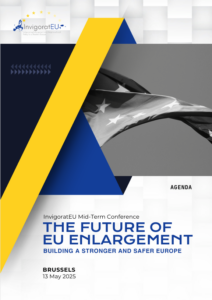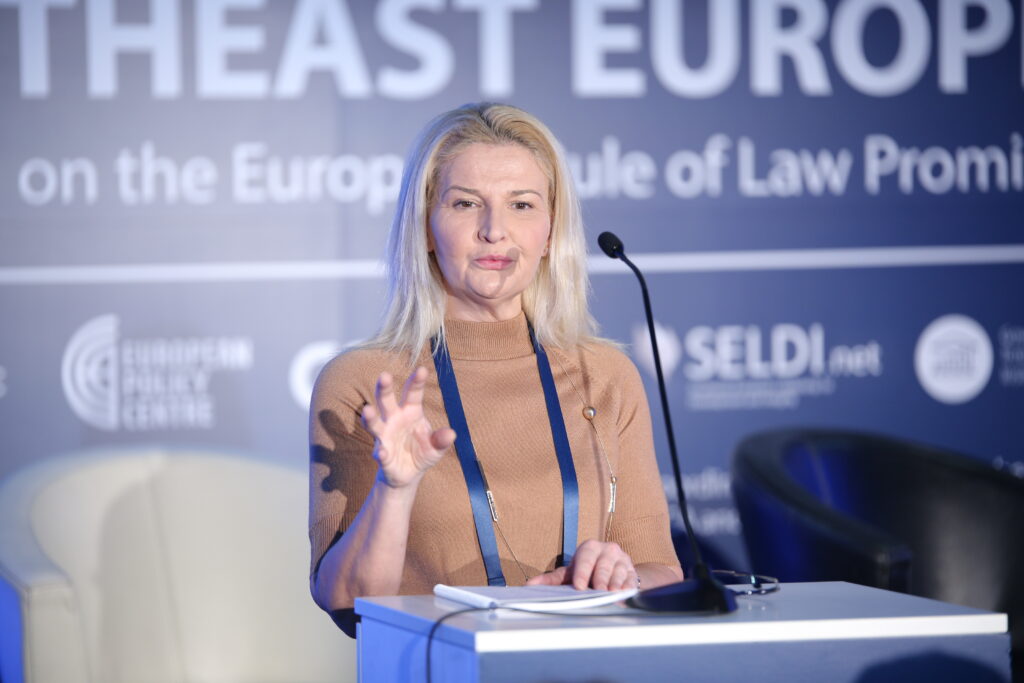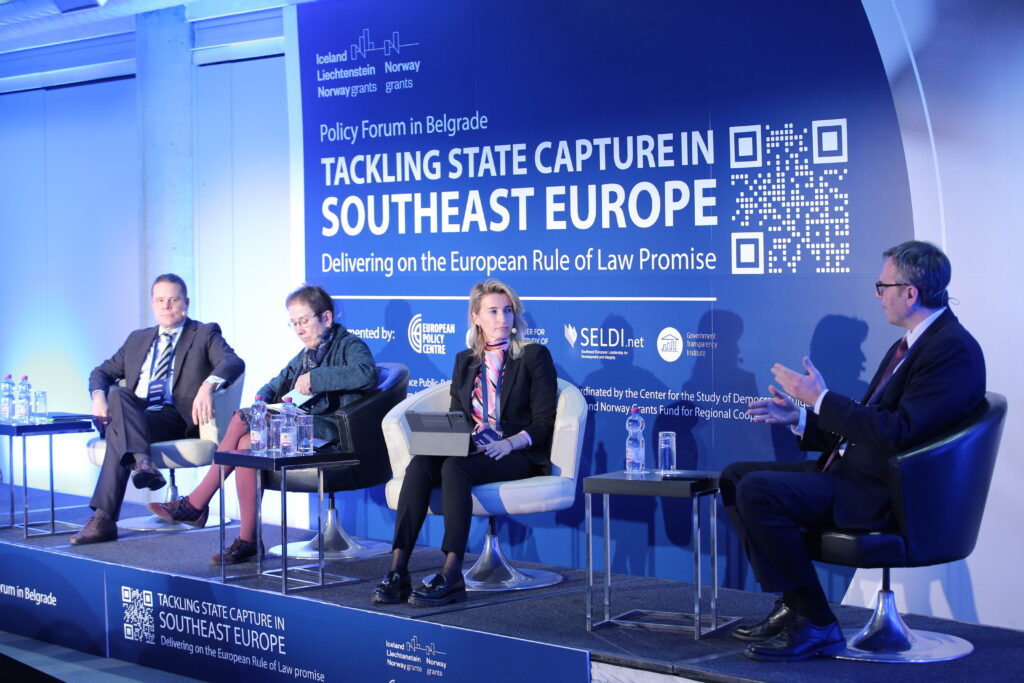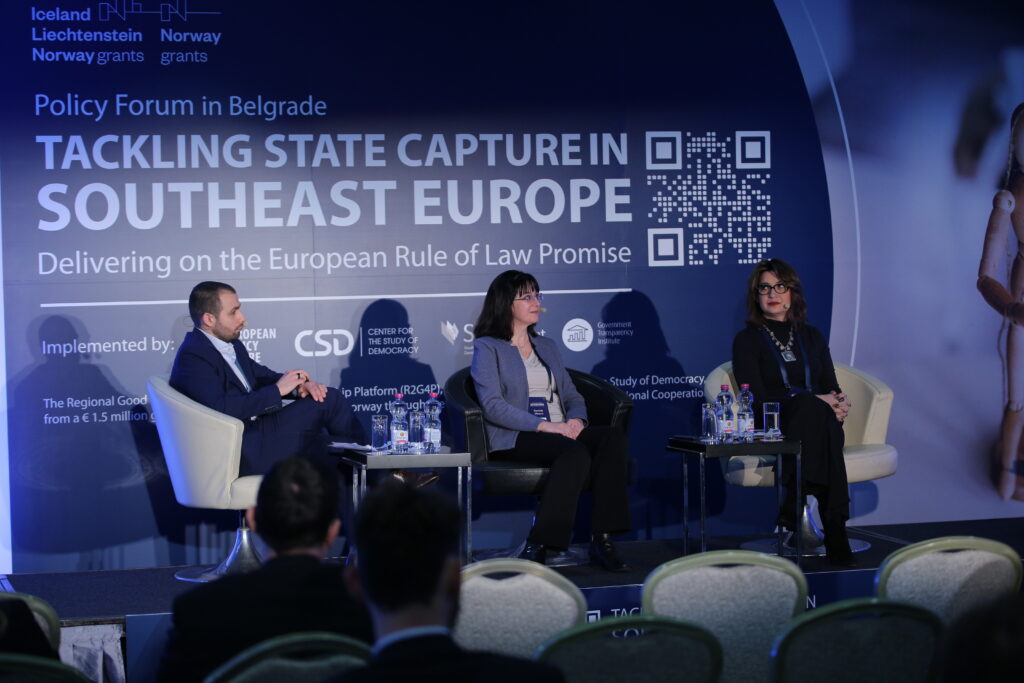Headquarters: Svetog Nauma 7, 11000
Office address: Đorđa Vajferta 13, 11000
Phone:: +381 11 4529 323

25th of January 2023. – A Conference was held today in Belgrade Tackling State Capture in Southeast Europe: Delivering on the European Rule of Law Promise organised by European Policy Centre – CEP, Belgrade, Center for the Study of Democracy – CSD, Sophia, within the project The Regional Good Governance Public-Private Partnership Platform (R2G4P).
The conference gathered more than 30 speakers from Southeast Europe in four panels and seven addresses, as well as many representatives from civil society, governments and embassies in Serbia and the region.
The conference began with introductory remarks by senior officials, among whom were the Minister of European Integration of the Republic of Serbia, Tanja Miščević, the US Ambassador to Serbia, Christopher Hill, and the Ambassador of the Kingdom of Norway, Jorn Eugen Gjelstad.
„People of Serbia are on the long journey of meeting new concepts and understanding the importance of rule of law and transparency. It is not only about joining the EU – you will certainly get there – it is about building society that understands all of this“, Hill said.

„Rule of law, good governance and anti-corruption are not only normative principles, but areas of highest importance for citizens“, pointed out Gjelstad.
Miščević explained that the fight against corruption in the EU enlargement methodology has become a horizontal area, which means that „anti-corruption measures must be included in all negotiation chapters.“ Miščević additionally emphasized the role of civil society in the process of fighting corruption and stated that its role is crucial: „Currently, we have a working group that is not only cross-sectoral in terms of state institutions, the Government of Serbia, but also includes civil society and professional associations. The fight against corruption is not only about having the possibility for preventive measures, but also about having punitive measures and being as efficient as possible.“

Srđan Majstorović, Chairman of CEP Governing Board, said that the situation in Serbia is quite worrying when it comes to the fight against corruption. He pointed out that solidarity can exist for us only if there is mutual trust. „Our society should first recognize these problems, and then work to solve them in order to prove that we are trustworthy“, Majstorović said.
„There is no democracy in the world that does not face problems of state capture, which means that power is too concentrated and we need to strengthen the mechanisms of checks and balances to prevent this“, said Ruslan Stefanov, Program Director of the CSD. „The war in Ukraine was a wake-up call. It turned corruption into a security issue“, he said.
The four panels discussed the collection of data on public procurement and the monitoring of investments of EU funds, as well as ways to recognize and prevent illicit enrichment. Emphasis was also placed on monitoring instruments and sector cooperation in the fight against corruption and the important role of citizens in this fight.
The topic of the first panel was exposing corruption risks from politically connected companies. Savo Manojlović, campaigns director of the Kreni – Promeni movement, emphasized that citizens are most important link in solving the problem of corruption.
After that, there was talk about illicit enrichment, especially public servants and politically exposed persons, where Daniel Bellingher from the National integrity agency in Romania gave a positive example of the reform of the process of fighting corruption in Romania and explained how civil society can effectively support the reform of the law that will determine the further course of the fight against corruption.
The topic of the conference was also public-private partnerships at the state and local level. Most of the talk was about the importance of monitoring the entire process, as well as for citizens to be motivated to participate in it by reporting every form of corruption, and the institutions, with timely response, will motivate citizens to stay in the very process of monitoring the entire process of fighting corruption.
The event discussed the future of good governance reforms in Southeast Europe, as well as what governments, civil society and international partners can do better to promote the rule of law and build resilience. It was also discussed how instruments such as enlargement conditions, the EU Report on the Rule of Law, the Summit for Democracy or the so-called „magnit“ legislation (Laws on restrictive measures and targeted sanctions for corruption and human rights violations) can be more effective in promoting change, which are the lessons that the new candidates for EU membership, Ukraine and Moldova, can learn from the examples of countries that are long in the negotiation process.

All speakers agreed that rule of law, transparency and the fight against corruption are crucial for the development and stability of the region, as well as for progress on the road to the EU. The conference provided an opportunity to exchange experiences and ideas on how to improve the situation in the region and how to strengthen mechanisms to prevent state capture.
Public procurement was also a topic of discussion, with an emphasis on how it represents one of the key avenues of corruption and fraud for public office holders in Southeast Europe. Speakers expressed the need to strengthen mechanisms for verification and transparency in public procurement, as well as the need to establish accountability for law violations and corruption in this sector.

Among the speakers at the event were Viola von Cramon-Taubadel and Daniel Freund, members of the European Parliament, Krum Zarkov, Minister of Justice of Bulgaria, Miroslav Milićević, Vice President of the Anti-Corruption Council and many others.
Freund referred to the current situation in Europe, as well as the crisis of the rule of law in the Union.
„The EU closely monitors the development of the rule of law, both in member states and candidate states. It is very important to monitor the EU’s actions at this historical moment and learn from its mistakes“, concluded Freund.
The forum was jointly organized by the European Policy Centre (Serbia), Center for Study of Democracy (Bulgaria) and the Regional Anti-Corruption Network www.seldi.net within the framework of The regional good governance public-private partnership platform (R2G4P). The platform is funded by the EEA and the Norwegian Regional Cooperation Grant Fund. The Center for the study of Democracy and the Government Transparency Institute (Hungrary) presented findings from the second SEE Good Governance Report.